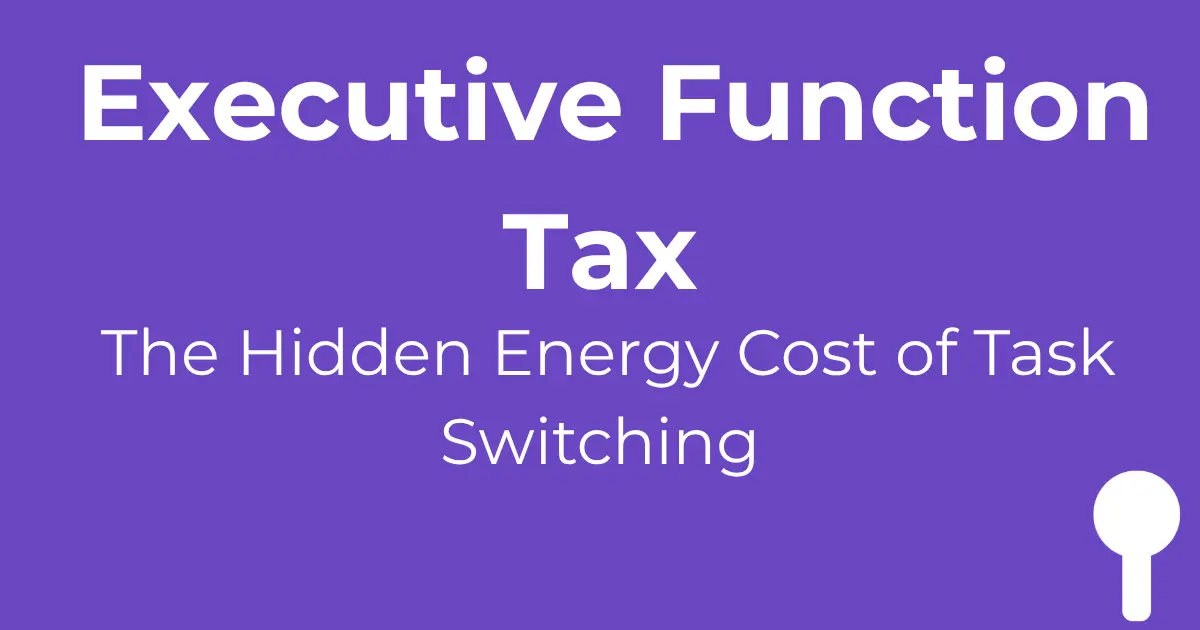
Half My Energy Is Gone Before I Even Start the Task
Executive function tax is what it costs me to start. Switching tasks, planning, finding things, and getting my brain online.
Thinking about where everything is. What I specifically need to find. How to do it.
People think it’s minor. For me, it’s the part that empties me.
Example 1: Meditation to Running
I finish meditating. I want to go run.
Before I can start:
- Text my mom that I'm running (she demands this every time, regardless of time of day)
- Find my heart rate monitor
- Decide how long I'm running
- Calculate how much time I have
The masking involved—performing normalcy for my mom, not showing my frustration that she demands updates for something I do every day—adds to the cognitive load. I'm managing her anxiety while trying to prepare for my run.
All of that cognitive load drains 4 energy.
Running is very enjoyable for me. But the task switching is not. Having to text my mom about something I do every single day is frustrating and annoying.
I haven't even started running yet and I've lost 4 energy.
Example 2: Being Woken Up for a Minor Task
My mom wakes me up before I naturally wake to inform me about something lost. Wants me to find it immediately.
This is far more draining due to the abruptness of the switch. I just woke up. Now I'm trying to find something quickly for my impatient family, hoping they won't get mad or upset.
7 energy units gone.
Taken from a restful state to an immediately alert one—especially for minor tasks that could easily be handled later in the day. This drains most of my energy before I even start my day.
Sleep doesn’t protect me from this. The forced transition drains me before my day even starts.
What Neurotypicals Don't Understand
They would either brush it off or not understand at all what I'm saying.
The cognitive tax of switching tasks is more impactful for me than it is for them.
Most neurotypicals find it 'mildly impractical. For me, it's extremely exhausting.
What Tracking Showed Me
I noticed which days were exhausting me the most. They were days I switched tasks a lot or too fast.
So now I give myself a mandatory 5-minute buffer before switching tasks—unless it’s a real emergency.
I'm not going to exhaust myself for an environment that clearly doesn't accommodate me.
The Reality
4 energy units to start running. 7 energy units for being woken up and given a task.
Multiple task switches per day compound into autistic burnout When I'm forced to switch tasks 10+ times daily at the warehouse, that executive function tax accumulates until I'm completely shut down.
Executive function tax is invisible to neurotypicals. But it destroys me before I even begin the actual task.
I'm Omari, a 23-year-old autistic adult who's been managing chronic burnout for 5+ years while working warehouse shifts.
If I can see the tax building up, I can stop before I hit shutdown.
This is why I built Spoons. To see the hidden costs. To know when task switching is draining me. To enforce boundaries that protect my energy.
Launching April 2026. getspoons.app - One email when it's ready. No spam.
— Omari
Note: I'm sharing my personal experience as an autistic adult, not medical advice. If you're experiencing severe burnout or crisis, please consult a healthcare provider familiar with autism.
